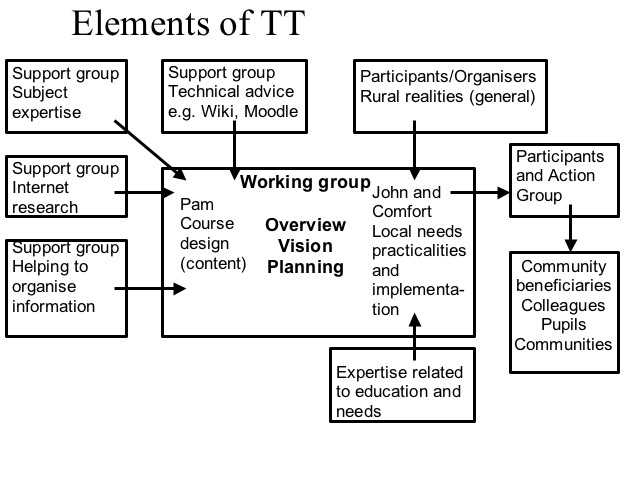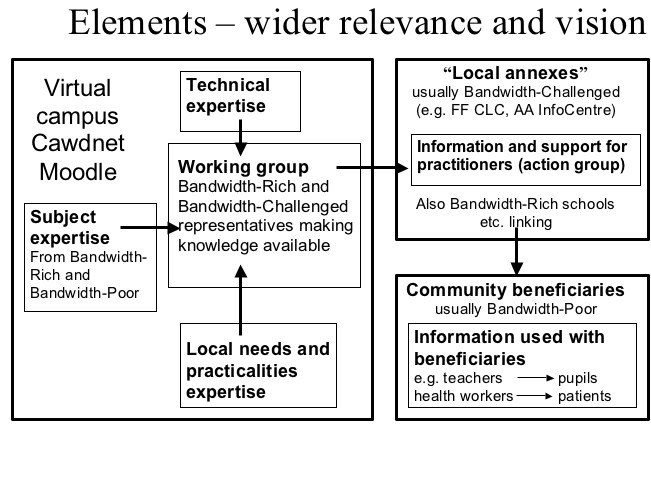|
Informal ODL in resource poor setting, case study from rural Nigeria John Dada, Fantsuam Foundation Abstract
SUMMARY Fantsuam Foundation is a rural women's NGO in northern Nigeria. We have developed programs that complement the gender- and youth-focussed ICT initiatives and microfinance services of the organization. One of such initiatives was awarded the First Hafkin Africa Prize (www.apc.org/english/hafkin). The sustainability of Fantsuam Foundation's work has been through timely response to community development needs through efficient needs assessment, deployment of available resources and a rigorous and transparent evaluation of the value-addition of the activities.
Fantsuam Foundation has developed a replicable model for social change in rural Nigeria. It has three main elements, commercial, social, and educational. The educational/training programmes are wide ranging. There are formal certificated courses, such as CISCO courses; training on economic management related to the microfinance programme; an in-service training programme for teachers, and informal training on nutrition, hygiene, community health, reproductive and other health related issues through Positive Concern. INTRODUCTION Fantsuam Foundation's microfinance bank and associated commercial services is the essential basis for the sustainable development of social and educational services. All social and educational systems have to be paid for, and in countries where they are free at the point of delivery, they are paid for through national and local taxation, which in turn is dependant on income generated through the commercial sector. The Fantsuam Foundation approach has been developing this model on a local level, in that its microfinance activities have been subsidizing social services and education/training initiatives. As Fantsuam Foundation develops new microfinance products and services it will be able to support additional social and educational initiatives, which in turn will increase the commercial strength of the community, in a sustainable and increasing virtuous circle of development. This paper presents Fantsuam's experience in promoting formal and informal education at various levels using a combination of strategies. WIDER RELEVANCE AND VISION Teachers Talking About ICT (“TT” for short) is a transnational project that “walks the talk” of ICT4Ed in the various ways that ICTs enable the project.
At the centre is a core group with a relationship “across the digital divide”! * John Dada and others at “Bandwidth Challenged” Fantsuam, repeating the needs of the local rural communities. * Pamela McLean and others who are part of the “Bandwidth Rich” (BR) community.
This core group pulls in essential information and expertise of various kinds: * Local knowledge
- General information about needs e.g. local teachers are asking for help to become computer literate even though they have no electricity or computers in their schools.
- Detailed information about rural realities.
* Technical expertise - Advice on available tools and how to make the most of them in our situation. - VSAT and LAN at FF - E-groups, chats and conferencing. - Wikis - Other collaborative tools.
* Subject expertise related to use of computers in education. - Some direct from subject expertise. - Some pulled down from the Internet.
It assembles its information and knowledge and presents it in appropriate ways:
* Face to Face training sessions * Resources - diagrams and notes available as printouts via the Internet. * Wiki * Emails to support group * Synchronised online groups.
After the course Fantsuam remains a contact point for the teachers - some of whom belong to an ongoing action group. This group is able to remain in contact across the digital divide as far as local circumstances and resources allow.
It is important to note that we are using the potential of the Internet in our training - we are not delivering a course through e-learning in the normal sense of the word. Our teachers take away various lesson plans and resources appropriate for use in their resource-poor classrooms.
The model of transnational internet-enabled collaboration shown here is applicable for other purposes. We already have a small but active Health Workers group, and other groups are also beginning to take shape.
This project is on a small scale and has been largely self-funded. However, the mix of expertise that it has brought together has enabled it to take unusual and successful approaches to ICT4Ed in rural Nigeria - approaches which could be applicable elsewhere.
Fig 1: TT Relevance and Vision
Fig 2: TT Diagram
Glossary: TT = Teachers Talking Group Pam = UK based, bandwidth-rich partner John and Comfort = Nigeria based, bandwidth-challenge partners
1
Figures |

